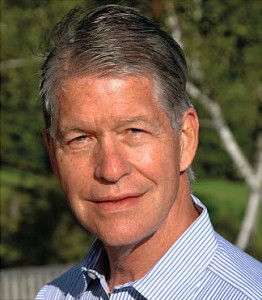DEGREE: B.A. in history; M.B.A. in international finance, The Wharton School, The University of Pennsylvania
JOB TITLE: Owner and CEO, Harvest Protection Network
FAVORITE TRINITY MEMORY: My father was born and raised in England. In the spring of my senior year, he wrote me a letter making it clear that, following graduation, I was on my own financially and I should start thinking about getting a job. The next day, a Navy recruiter visited the campus, and I took the test for Officer Candidate School in Newport, Rhode Island, and I passed. I wrote to Dad that I had a job! So my greatest Trinity memory was seeing that Navy recruiter walk on the campus the day after my father’s get-a-job letter. (Editor’s Note: We have learned that Ian Bennett ’62 also holds the Trinity football career record for average yards per punt: 40.97 yards.)
REPORTER: What is the mission of the Harvest Protection Network?
BENNETT: To protect harvested crops from spoilage. For more information, please go to www.HarvestProtectionNetwork.com.
REPORTER: What brought the problem of inadequate storage facilities for sub-Saharan farmers to your attention?
BENNETT: On July 14, 2009, the then-president of Senegal, Abdoulaye Wade, asked me to meet him in New York City. If that sounds like big stuff, it isn’t. Presidents of African countries are accessible. I had been living in Senegal off and on since 1972. I remember the date I met with the president because it was Bastille Day, and Dakar was the center of the French West African colonization the same as Nairobi was for the British in East Africa. President Wade said that members of his farming community were losing 25 percent of their annual harvest due to inadequate storage. He asked if I could help him solve this problem.
REPORTER: What are some of the challenges that you’ve faced with your work in the field?
BENNETT: The biggest challenge doing business in Africa is financing. You have to bring project funding with you to demonstrate that you have confidence in whatever it is you are offering. My company has been fortunate to realize the support of the U.S. Export-Import Bank under its Credit Guarantee Facility (CGF) Program. The CGF Program provides up to 85 percent loan financing for goods produced in the United States. The repayment term is five years at an interest rate of seven to nine percent per annum. That interest rate is extraordinarily competitive in Africa. As an example, the Central Bank of Nigeria’s lending rate to commercial banks is 15 percent, and the resulting commercial bank rate is 22 percent to 25 percent per annum.
REPORTER: What do you see as your biggest accomplishment in Nigeria?
BENNETT: Selling my first storage building. That has led to a discussion of the purchase of 200 buildings supported by a Nigerian government guarantee to cover that portion of the funding not covered by the U.S. Export-Import Bank. Nigeria saved my program. I was a guest speaker at a food security conference sponsored by The Rockefeller Foundation and The University of Pennsylvania (www.feedingcities.com). The senior lady representing The Rockefeller Foundation asked me if I was doing business in Nigeria, and I said no. She gave me the name and contact information for a gentleman who she said “used to work for the foundation.” That gentleman is Nigeria’s minister of agriculture, which is how my Nigerian dialogue began.
REPORTER: How did your time at Trinity affect your path in life?
BENNETT: I approached my time at Trinity with the belief that this was an opportunity to try anything. I have always enjoyed the camaraderie of sports. I played football in the fall, swimming for two years and squash for two years in the winter, and track and then tennis in the spring. I don’t think you can do that anymore, which is too bad. I also played Biff Loman in Death of a Salesman, was a member of a fraternity, and ran the campus fund to raise money for charitable gifts. I think my father thought I had an attention span problem. I also served as a member of Medusa, which was a student-based discipline group that I think has since been disbanded. So “how did this affect my path in life?” It made me want to find something to do that matters. With an M.B.A. from Wharton, I think I was supposed to work for a bank or perhaps a brokerage house and spend time trying to talk my friends into buying some stocks or bonds. I didn’t feel like there was any value added, and, by the way, what if the stocks went down?
REPORTER: Was there a Trinity professor who had an impact on your work? Who was it, and how did that professor make a difference?
BENNETT: My favorite professor was Dr. [Eugene] Davis, who taught ancient history. He delivered his lectures while seated on top of his desk without notes. When he spoke, you were there in Rome in the Forum. He talked about how men would participate in festivities drinking and eating and then climb onto horse-drawn wagons with octagonal wheels that made them throw up so they could return to the Forum for more festivities. Since then, I have never spoken using notes. I have found that to translate into confidence on the part of your audience that you really know your subject. I have never gotten as good as Dr. Davis, but I’m trying.

